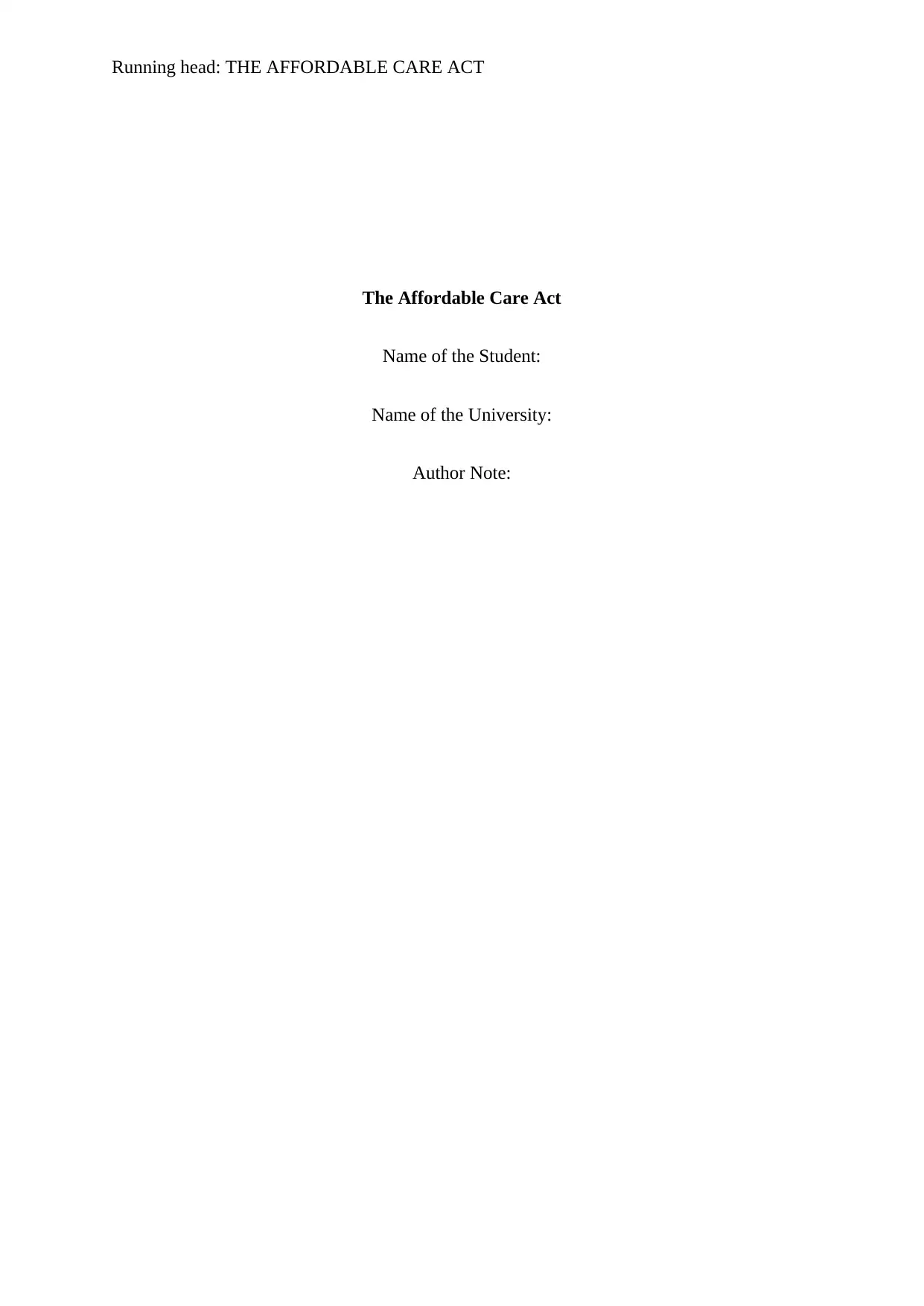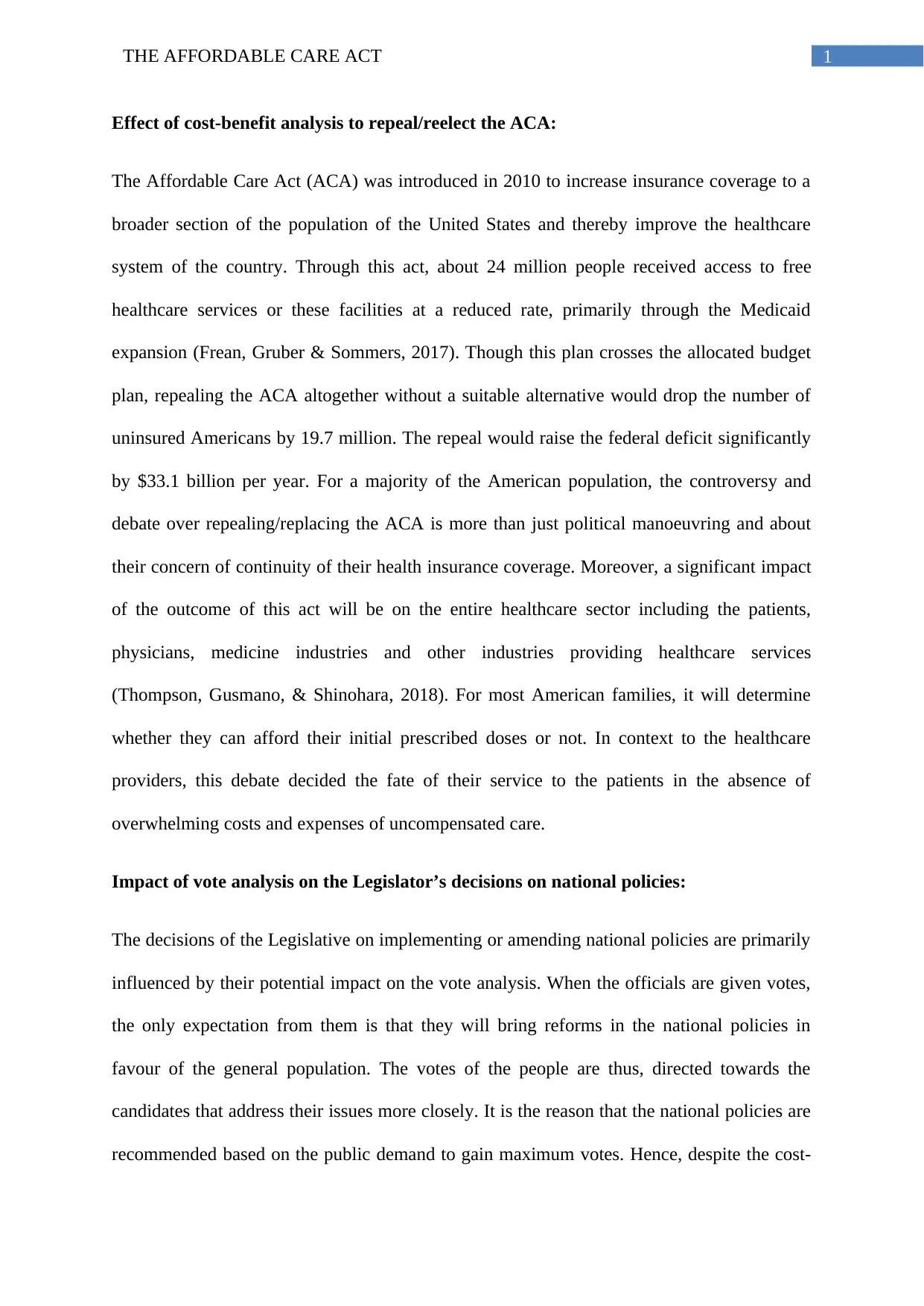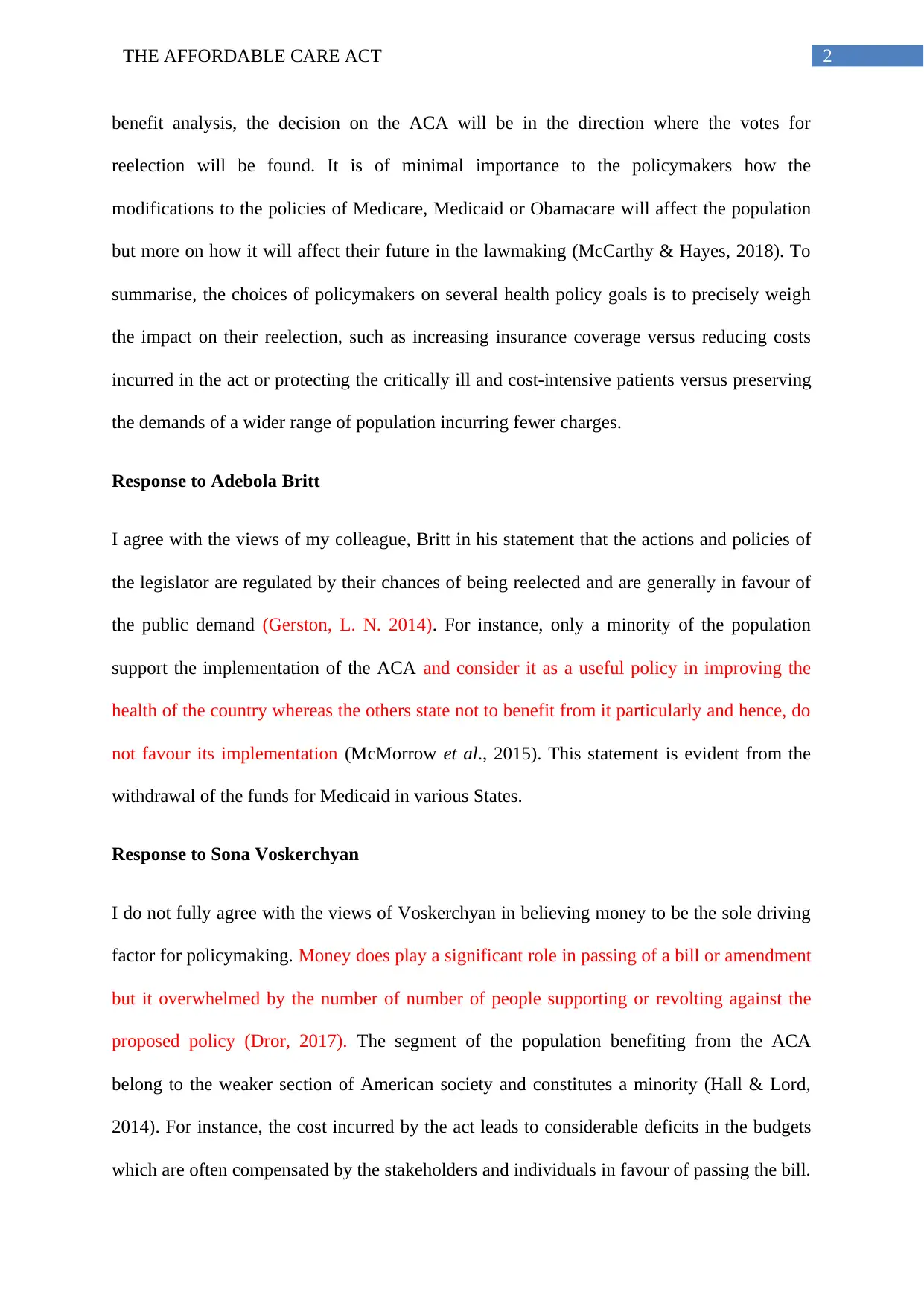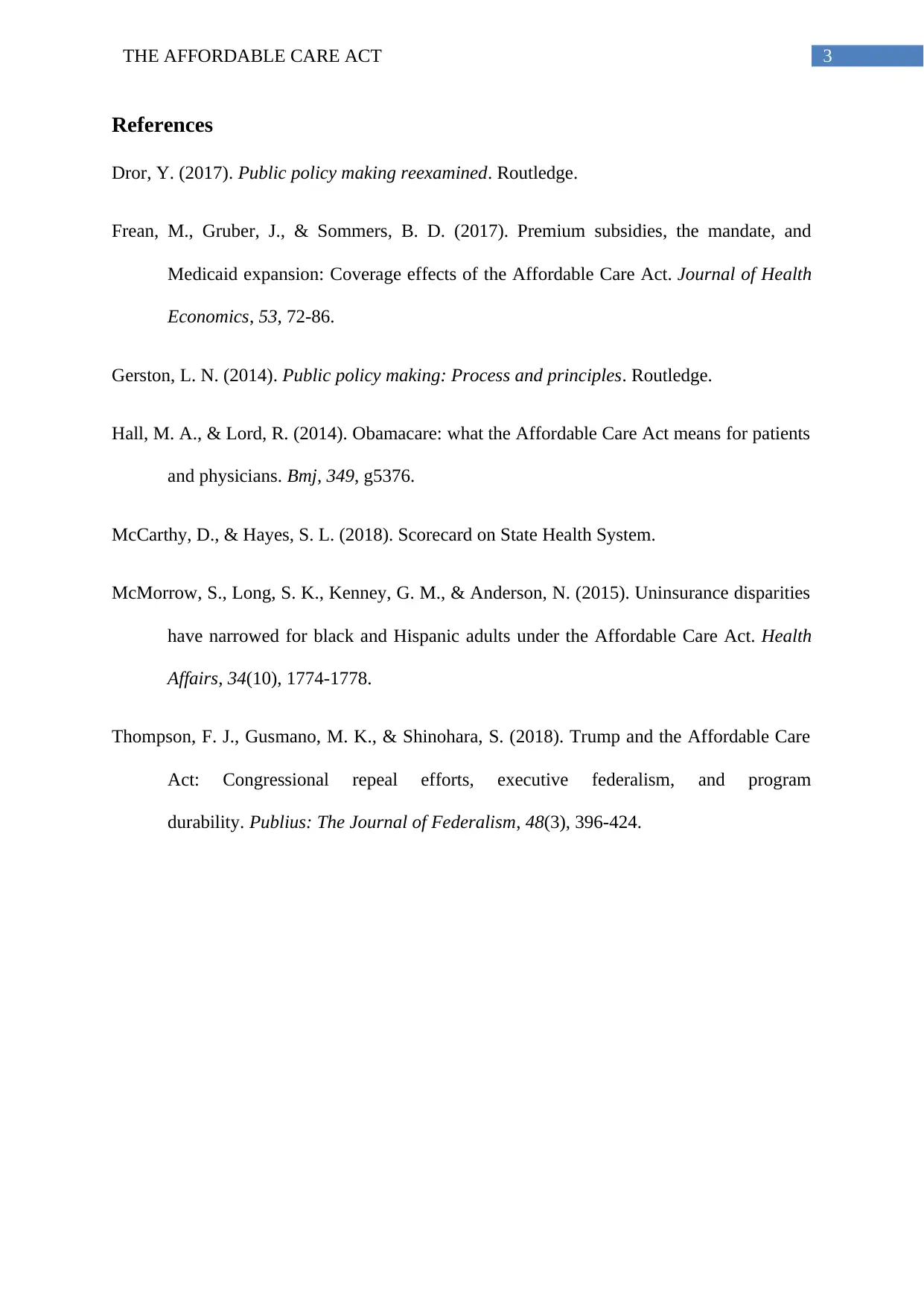NURS 6050 Week 3 Discussion: The ACA, Legislators, and Reelection
VerifiedAdded on 2022/08/21
|4
|986
|17
Discussion Board Post
AI Summary
This discussion post examines the Affordable Care Act (ACA) and its impact on healthcare policy, focusing on how legislators' decisions are influenced by the potential for reelection. The author argues that the cost-benefit analysis, in terms of votes, significantly affects efforts to repeal or replace the ACA. The post analyzes the influence of vote analysis on legislative leaders' recommendations. The author agrees with a colleague's view that legislators' actions are driven by reelection prospects and aligns with public demand. The author also disagrees with the view that money is the sole driver of policymaking, emphasizing the importance of public support. The author provides references to support the arguments.

Running head: THE AFFORDABLE CARE ACT
The Affordable Care Act
Name of the Student:
Name of the University:
Author Note:
The Affordable Care Act
Name of the Student:
Name of the University:
Author Note:
Paraphrase This Document
Need a fresh take? Get an instant paraphrase of this document with our AI Paraphraser

1THE AFFORDABLE CARE ACT
Effect of cost-benefit analysis to repeal/reelect the ACA:
The Affordable Care Act (ACA) was introduced in 2010 to increase insurance coverage to a
broader section of the population of the United States and thereby improve the healthcare
system of the country. Through this act, about 24 million people received access to free
healthcare services or these facilities at a reduced rate, primarily through the Medicaid
expansion (Frean, Gruber & Sommers, 2017). Though this plan crosses the allocated budget
plan, repealing the ACA altogether without a suitable alternative would drop the number of
uninsured Americans by 19.7 million. The repeal would raise the federal deficit significantly
by $33.1 billion per year. For a majority of the American population, the controversy and
debate over repealing/replacing the ACA is more than just political manoeuvring and about
their concern of continuity of their health insurance coverage. Moreover, a significant impact
of the outcome of this act will be on the entire healthcare sector including the patients,
physicians, medicine industries and other industries providing healthcare services
(Thompson, Gusmano, & Shinohara, 2018). For most American families, it will determine
whether they can afford their initial prescribed doses or not. In context to the healthcare
providers, this debate decided the fate of their service to the patients in the absence of
overwhelming costs and expenses of uncompensated care.
Impact of vote analysis on the Legislator’s decisions on national policies:
The decisions of the Legislative on implementing or amending national policies are primarily
influenced by their potential impact on the vote analysis. When the officials are given votes,
the only expectation from them is that they will bring reforms in the national policies in
favour of the general population. The votes of the people are thus, directed towards the
candidates that address their issues more closely. It is the reason that the national policies are
recommended based on the public demand to gain maximum votes. Hence, despite the cost-
Effect of cost-benefit analysis to repeal/reelect the ACA:
The Affordable Care Act (ACA) was introduced in 2010 to increase insurance coverage to a
broader section of the population of the United States and thereby improve the healthcare
system of the country. Through this act, about 24 million people received access to free
healthcare services or these facilities at a reduced rate, primarily through the Medicaid
expansion (Frean, Gruber & Sommers, 2017). Though this plan crosses the allocated budget
plan, repealing the ACA altogether without a suitable alternative would drop the number of
uninsured Americans by 19.7 million. The repeal would raise the federal deficit significantly
by $33.1 billion per year. For a majority of the American population, the controversy and
debate over repealing/replacing the ACA is more than just political manoeuvring and about
their concern of continuity of their health insurance coverage. Moreover, a significant impact
of the outcome of this act will be on the entire healthcare sector including the patients,
physicians, medicine industries and other industries providing healthcare services
(Thompson, Gusmano, & Shinohara, 2018). For most American families, it will determine
whether they can afford their initial prescribed doses or not. In context to the healthcare
providers, this debate decided the fate of their service to the patients in the absence of
overwhelming costs and expenses of uncompensated care.
Impact of vote analysis on the Legislator’s decisions on national policies:
The decisions of the Legislative on implementing or amending national policies are primarily
influenced by their potential impact on the vote analysis. When the officials are given votes,
the only expectation from them is that they will bring reforms in the national policies in
favour of the general population. The votes of the people are thus, directed towards the
candidates that address their issues more closely. It is the reason that the national policies are
recommended based on the public demand to gain maximum votes. Hence, despite the cost-

2THE AFFORDABLE CARE ACT
benefit analysis, the decision on the ACA will be in the direction where the votes for
reelection will be found. It is of minimal importance to the policymakers how the
modifications to the policies of Medicare, Medicaid or Obamacare will affect the population
but more on how it will affect their future in the lawmaking (McCarthy & Hayes, 2018). To
summarise, the choices of policymakers on several health policy goals is to precisely weigh
the impact on their reelection, such as increasing insurance coverage versus reducing costs
incurred in the act or protecting the critically ill and cost-intensive patients versus preserving
the demands of a wider range of population incurring fewer charges.
Response to Adebola Britt
I agree with the views of my colleague, Britt in his statement that the actions and policies of
the legislator are regulated by their chances of being reelected and are generally in favour of
the public demand (Gerston, L. N. 2014). For instance, only a minority of the population
support the implementation of the ACA and consider it as a useful policy in improving the
health of the country whereas the others state not to benefit from it particularly and hence, do
not favour its implementation (McMorrow et al., 2015). This statement is evident from the
withdrawal of the funds for Medicaid in various States.
Response to Sona Voskerchyan
I do not fully agree with the views of Voskerchyan in believing money to be the sole driving
factor for policymaking. Money does play a significant role in passing of a bill or amendment
but it overwhelmed by the number of number of people supporting or revolting against the
proposed policy (Dror, 2017). The segment of the population benefiting from the ACA
belong to the weaker section of American society and constitutes a minority (Hall & Lord,
2014). For instance, the cost incurred by the act leads to considerable deficits in the budgets
which are often compensated by the stakeholders and individuals in favour of passing the bill.
benefit analysis, the decision on the ACA will be in the direction where the votes for
reelection will be found. It is of minimal importance to the policymakers how the
modifications to the policies of Medicare, Medicaid or Obamacare will affect the population
but more on how it will affect their future in the lawmaking (McCarthy & Hayes, 2018). To
summarise, the choices of policymakers on several health policy goals is to precisely weigh
the impact on their reelection, such as increasing insurance coverage versus reducing costs
incurred in the act or protecting the critically ill and cost-intensive patients versus preserving
the demands of a wider range of population incurring fewer charges.
Response to Adebola Britt
I agree with the views of my colleague, Britt in his statement that the actions and policies of
the legislator are regulated by their chances of being reelected and are generally in favour of
the public demand (Gerston, L. N. 2014). For instance, only a minority of the population
support the implementation of the ACA and consider it as a useful policy in improving the
health of the country whereas the others state not to benefit from it particularly and hence, do
not favour its implementation (McMorrow et al., 2015). This statement is evident from the
withdrawal of the funds for Medicaid in various States.
Response to Sona Voskerchyan
I do not fully agree with the views of Voskerchyan in believing money to be the sole driving
factor for policymaking. Money does play a significant role in passing of a bill or amendment
but it overwhelmed by the number of number of people supporting or revolting against the
proposed policy (Dror, 2017). The segment of the population benefiting from the ACA
belong to the weaker section of American society and constitutes a minority (Hall & Lord,
2014). For instance, the cost incurred by the act leads to considerable deficits in the budgets
which are often compensated by the stakeholders and individuals in favour of passing the bill.
⊘ This is a preview!⊘
Do you want full access?
Subscribe today to unlock all pages.

Trusted by 1+ million students worldwide

3THE AFFORDABLE CARE ACT
References
Dror, Y. (2017). Public policy making reexamined. Routledge.
Frean, M., Gruber, J., & Sommers, B. D. (2017). Premium subsidies, the mandate, and
Medicaid expansion: Coverage effects of the Affordable Care Act. Journal of Health
Economics, 53, 72-86.
Gerston, L. N. (2014). Public policy making: Process and principles. Routledge.
Hall, M. A., & Lord, R. (2014). Obamacare: what the Affordable Care Act means for patients
and physicians. Bmj, 349, g5376.
McCarthy, D., & Hayes, S. L. (2018). Scorecard on State Health System.
McMorrow, S., Long, S. K., Kenney, G. M., & Anderson, N. (2015). Uninsurance disparities
have narrowed for black and Hispanic adults under the Affordable Care Act. Health
Affairs, 34(10), 1774-1778.
Thompson, F. J., Gusmano, M. K., & Shinohara, S. (2018). Trump and the Affordable Care
Act: Congressional repeal efforts, executive federalism, and program
durability. Publius: The Journal of Federalism, 48(3), 396-424.
References
Dror, Y. (2017). Public policy making reexamined. Routledge.
Frean, M., Gruber, J., & Sommers, B. D. (2017). Premium subsidies, the mandate, and
Medicaid expansion: Coverage effects of the Affordable Care Act. Journal of Health
Economics, 53, 72-86.
Gerston, L. N. (2014). Public policy making: Process and principles. Routledge.
Hall, M. A., & Lord, R. (2014). Obamacare: what the Affordable Care Act means for patients
and physicians. Bmj, 349, g5376.
McCarthy, D., & Hayes, S. L. (2018). Scorecard on State Health System.
McMorrow, S., Long, S. K., Kenney, G. M., & Anderson, N. (2015). Uninsurance disparities
have narrowed for black and Hispanic adults under the Affordable Care Act. Health
Affairs, 34(10), 1774-1778.
Thompson, F. J., Gusmano, M. K., & Shinohara, S. (2018). Trump and the Affordable Care
Act: Congressional repeal efforts, executive federalism, and program
durability. Publius: The Journal of Federalism, 48(3), 396-424.
1 out of 4
Related Documents
Your All-in-One AI-Powered Toolkit for Academic Success.
+13062052269
info@desklib.com
Available 24*7 on WhatsApp / Email
![[object Object]](/_next/static/media/star-bottom.7253800d.svg)
Unlock your academic potential
Copyright © 2020–2026 A2Z Services. All Rights Reserved. Developed and managed by ZUCOL.





